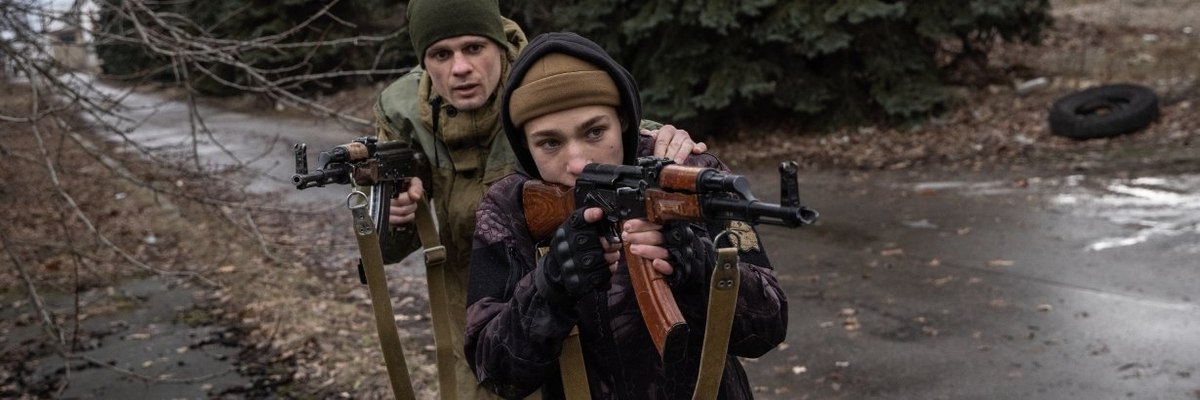Briton, France, Germany, and Italy would support further sanctions
As the invasion of Ukraine enters its fifth day, bloody fighting continues to keep Russian forces out of major cities across the country, including the capital Kyiv.
What further actions would Europeans support against Russia?
The weekend saw a fresh round of sanctions against Russia in response to its aggression. Economic sanctions are beginning to bite into the Russian economy, with the Rouble at an all-time low and inflation doubling. Some Russian banks have also been barred from the international payment system SWIFT.
Further economic sanctions are the most supported additional measures in YouGov's surveys across Europe. Britons are the most in favour of additional economic penalties against Russia (77%), with 65% of Germans, 60% of French people, and 59% of Italians also supportive.
Of the nations included, Britons are the only nation with a majority (60%) in support of sending offensive weaponry to Ukraine – versus 47% of those in France, 45% of Germans and 37% of Italians.
While troop deployments to Ukraine remain off the table for NATO countries, they can reinforce other NATO allies in the region – something half of Britons (54%) and Germans (50%) would support. Only somewhat more than a third of French (39%) and Italians (37%) would also support sending troops to allied nations.
As for direct action, Britons are more in favour of coordinated airstrikes against Russian targets in Ukraine (31%) than France, Italy and Germany (19-20%). Another 26% of Britons would support sending British troops to Ukraine, versus 21% of Italians, 19% of French, and 17% of Germans who say the same of their own soldiers.
As well as boots on the ground, cyber-attacks have also played a part in the invasion of Ukraine. Half of Britons (55%) and Italians (49%), along with two in five Germans (39%), would support undertaking cyberattacks against Russian military capabilities.
Britons are also more supportive of opening up a political front against Putin. A further 62% would support targeting media in Russian-speaking parts of Ukraine to urge people not to support the Russian leadership, as would half of Germans and Italians (49%).
Another 59% of Britons, 43% of Italians and 42% of Germans would support giving resources to domestic political opponents of Putin’s regime.
Britons are most willing to bear the cost of sanctions
While people are most supportive of additional sanctions against Russia, these come at a cost, not just because of a lack of trading with Russia, but because Russia will likely implement its own sanctions in retaliation. One concern is the energy Russia supplies to Europe and the increased costs that will occur if the supply is interrupted.
Some 44% of Britons would accept such sanctions if they lead to fuel shortages, with 37% opposed. Germans are split over sanctions that would see oil and gas in short supply (41% support to 40% opposed) while those in Italy tend to oppose them by 48% to 30%, and the French are outright opposed (56% vs 27%).
There is similar sentiment towards sanctions that would increase the cost of living, with Britons in favour, Germans split, and the French and Italians opposed.
There is less support for sanctions that would see hikes in energy prices. Britons are split 40% to 40%, Germans would tend to oppose them (44% vs 38% support), as would half of Italians (53%) and six in ten French respondents (61%).
How worried are Europeans about the conflict?
In Italy, 87% of people say they are worried about the situation between Russia and Ukraine – including 34% who are third “very worried”.
While there are similar numbers of people worried overall in Germany (86%), Great Britain (84%), France (83%), and the United States (80%) – it is Germans are the most concerned with 61% “very worried” by the conflict.
When it comes to potential escalation, two in five Germans (41%) think it likely the conflict will spill over into a wider war involving Germany, while 39% say it is unlikely to spread.
Half of Britons (52%) and Italians (51%) think it is likely that their countries will be dragged into a wider conflict - versus 26% and 36% respectively who think it unlikely.
American registered voters are the most likely to think that their nation will be drawn into in a wider war stemming from the Ukraine invasion (66%), with only a quarter doubtful (25%).
How do Europeans rate their leaders’ handling of the Russia-Ukraine situation?
Despite big public shows of financial, military, and moral support, people are split on their national leader's performance. In Great Britain, people are divided 36% to 36% on whether Boris Johnson is dealing with the invasion well or badly.
Sentiment is similar in France, where 36% think Emmanuel Macron is handling the situation well versus 40% who think he is doing poorly. In the United States, 41% of registered voters say Joe Biden is doing well at managing the situation, with another 43% thinking he is doing poorly.
By 44% to 38%, Italians are the only ones who tend to see Mario Draghi as managing the situation well.
The most significant difference in opinion is over new German Chancellor Olaf Scholz. While some 37% of Germans think Scholz is doing well at dealing with the invasion, 44% think his handling thus far has been bad.











